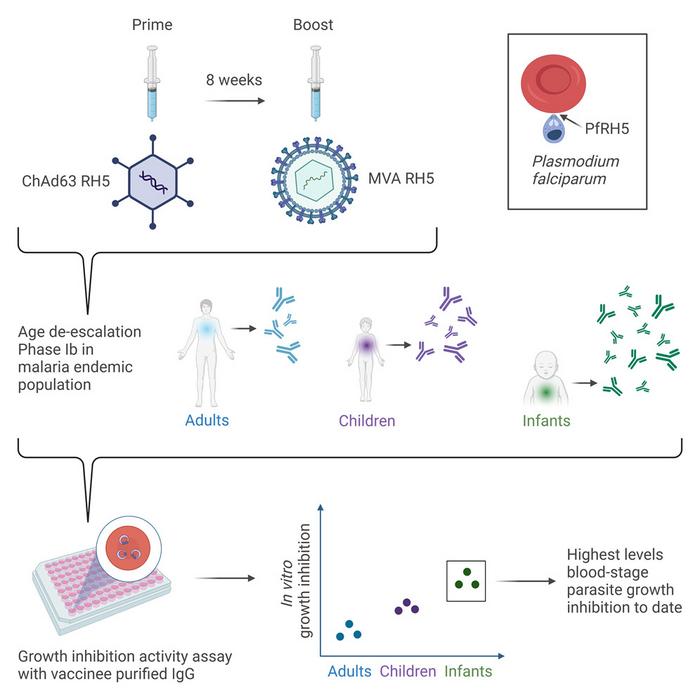An experimental malaria vaccine appears safe and promotes an immune response in African infants, one of the groups most vulnerable to severe malaria disease. There is currently only one malaria vaccine, “RTS,S” that is approved by the World Health Organization and offers partial disease protection. However, in the results of the early-stage phase Ib trial conducted in Tanzania and published on August 11th in the journal Med, researchers find that targeting RH5 – a protein that the malaria pathogen Plasmodium falciparum uses to invade red blood cells – can generate a promising immune response that is most pronounced in an infant cohort.

Credit: Med Silk et al.
An experimental malaria vaccine appears safe and promotes an immune response in African infants, one of the groups most vulnerable to severe malaria disease. There is currently only one malaria vaccine, “RTS,S” that is approved by the World Health Organization and offers partial disease protection. However, in the results of the early-stage phase Ib trial conducted in Tanzania and published on August 11th in the journal Med, researchers find that targeting RH5 – a protein that the malaria pathogen Plasmodium falciparum uses to invade red blood cells – can generate a promising immune response that is most pronounced in an infant cohort.
“Anti-sporozoite vaccines such as RTS,S need to be 100% effective in stopping the parasite from invading the liver to prevent disease,” says senior author Angela Minassian, a clinician scientist at the University of Oxford. “Even if just one parasite slips through the net, this will then go on to multiply in the liver, burst out into the bloodstream, and then infect red blood cells where the parasites then grow at an exponential rate. Having a blood-stage vaccine like RH5 on board gives you a second line of defense once the parasite has entered the bloodstream, allowing a second chance to stop malaria before it causes illness.”
A person is infected with malaria when bitten by an infected mosquito, which releases Plasmodium falciparum into the body. RTS,S and many other vaccine candidates teach the immune system how to target the parasite at this sporozoite stage, before it invades the liver. Once the parasite matures and is released from the liver into the bloodstream, Plasmodium falciparum displays RH5 and infects red blood cells, which causes disease. If an anti-sporozoite and an anti-RH5 vaccine were used in combination in the future, individuals could potentially experience more effective protection against malaria for a longer period of time.
“The data in the phase 1b trial reported here confirm, for the first time, that substantial anti-RH5 immune responses can be achieved safely by vaccination in infants from a malaria-endemic area,” say the authors.
The researchers conducted the vaccine trial in Bagamoyo, Tanzania, where the average malaria prevalence throughout the population is 13%. 63 participants aged 6 months to 35 years were enrolled and randomized to receive either the experimental malaria vaccine, called “ChAd63-MVA RH5,” or a control rabies vaccine. The trial was also double-blinded, meaning that neither the participants nor the vaccine administrators knew who received the malaria vaccine or the control. All participants were given the second dose of vaccine two months later and followed for four months after this.
The primary purpose of this study was to evaluate the safety of this vaccine in a population where malaria is endemic. Participants in both the control and treatment group reported pain at the injection site and a mild fever shortly after vaccination, but overall the vaccine was well tolerated and there were no safety concerns.
A secondary outcome of the study was whether the vaccine would promote an immune response. Researchers found that participants who received the malaria vaccine developed antibodies against RH5 in their blood upon follow-up. In the laboratory, these antibodies were able to inhibit the growth of the malaria parasite at high levels that are associated with disease protection. “These data justify onward progression to phase IIb field efficacy trials to determine whether parasite growth-inhibition levels of this magnitude can ultimately protect against clinical malaria.” say the authors.
The authors note that they observed the strongest immune responses in infants under 11 months, followed by children aged 1-6 years, then adults. “Why the infants and young children vaccinated with ChAd63-MVA RH5 induced such high levels of antibody remains to be fully understood,” say the authors. “Given that both anti-sporozoite and blood-stage malaria vaccine strategies necessitate very high levels of antibody to protect against parasite infection, current efforts remain focused on infants and young children.”
The researchers note that this was a small study that followed participants for only four months after receiving their full vaccine schedule. They recommend that additional phase Ia/Ib trials should be conducted to optimize the recommended age range, boosting schedule, and delivery platform for anti-RH5 vaccines. Currently, a phase 1b trial is planned in the Gambia which will look at the effects of combining an anti-RH5 vaccine with an anti-sporozoite vaccine.
###
This work was supported by the Medical Research Council. Information about conflicts of interest can be found in the text of the paper.
Med, Silk et al. “Superior antibody immunogenicity of a viral-vectored RH5 blood-stage malaria vaccine in Tanzanian infants as compared to adults” https://www.cell.com/med/fulltext/S2666-6340(23)00226-X
Med (@MedCellPress), Cell Press’ flagship medical journal, publishes transformative, evidence-based science across the clinical and translational research continuum—from large-scale clinical trials to translational studies with demonstrable functional impact, offering novel insights in disease understanding. Visit: https://www.cell.com/med. To receive Cell Press media alerts, please contact [email protected].
Journal
Med
DOI
10.1016/j.medj.2023.07.003
Method of Research
Experimental study
Subject of Research
People
Article Title
Superior antibody immunogenicity of a viral-vectored RH5 blood-stage malaria vaccine in Tanzanian infants as compared to adults
Article Publication Date
11-Aug-2023




